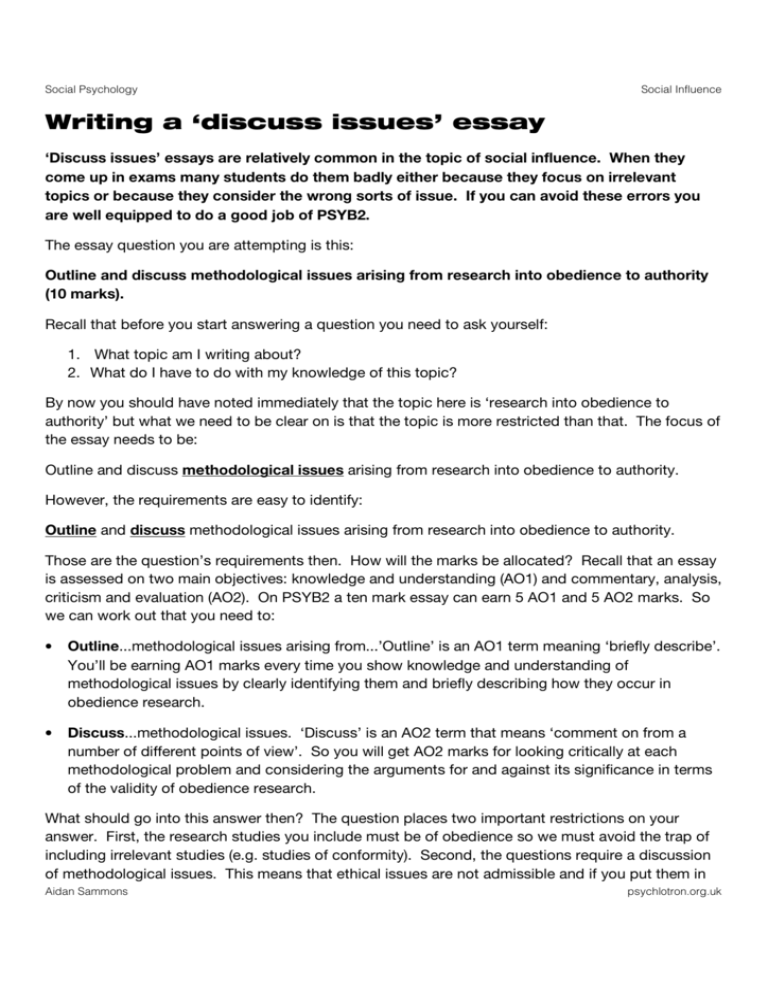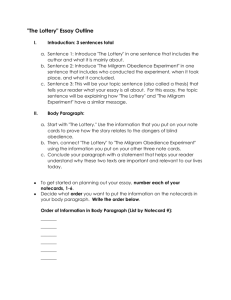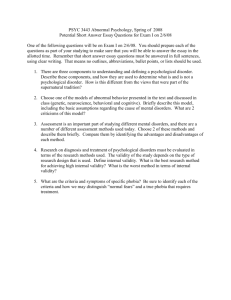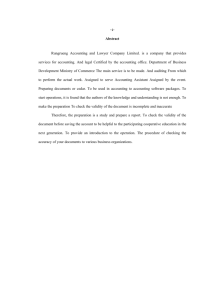Writing a 'discuss issues' essay
advertisement

Social Psychology Social Influence Writing a ‘discuss issues’ essay ‘Discuss issues’ essays are relatively common in the topic of social influence. When they come up in exams many students do them badly either because they focus on irrelevant topics or because they consider the wrong sorts of issue. If you can avoid these errors you are well equipped to do a good job of PSYB2. The essay question you are attempting is this: Outline and discuss methodological issues arising from research into obedience to authority (10 marks). Recall that before you start answering a question you need to ask yourself: 1. What topic am I writing about? 2. What do I have to do with my knowledge of this topic? By now you should have noted immediately that the topic here is ‘research into obedience to authority’ but what we need to be clear on is that the topic is more restricted than that. The focus of the essay needs to be: Outline and discuss methodological issues arising from research into obedience to authority. However, the requirements are easy to identify: Outline and discuss methodological issues arising from research into obedience to authority. Those are the question’s requirements then. How will the marks be allocated? Recall that an essay is assessed on two main objectives: knowledge and understanding (AO1) and commentary, analysis, criticism and evaluation (AO2). On PSYB2 a ten mark essay can earn 5 AO1 and 5 AO2 marks. So we can work out that you need to: • Outline...methodological issues arising from...’Outline’ is an AO1 term meaning ‘briefly describe’. You’ll be earning AO1 marks every time you show knowledge and understanding of methodological issues by clearly identifying them and briefly describing how they occur in obedience research. • Discuss...methodological issues. ‘Discuss’ is an AO2 term that means ‘comment on from a number of different points of view’. So you will get AO2 marks for looking critically at each methodological problem and considering the arguments for and against its significance in terms of the validity of obedience research. What should go into this answer then? The question places two important restrictions on your answer. First, the research studies you include must be of obedience so we must avoid the trap of including irrelevant studies (e.g. studies of conformity). Second, the questions require a discussion of methodological issues. This means that ethical issues are not admissible and if you put them in Aidan Sammons psychlotron.org.uk Social Psychology Social Influence your essay the examiner will ignore them (and your mark will probably be restricted because of the inclusion of irrelevant material. So the material we could include here would be: • • Studies of obedience: Milgram (1963); Hofling et al (1966); Bickman (1979); Gamson et al (1982) Methodological issues: External validity (setting; sample); internal validity (controls, demand characteristics) Remember that your focus here is on the issues, not the studies in themselves – you shouldn’t be describing the studies in lots of detail; rather you should be outlining the issues and illustrating them with relevant details from the studies. To fulfil the ‘discuss’ requirement you need critically to consider how much of a problem each issue actually is and look at the arguments for and against it. The AO1 skill we’re practising here is the skill of outlining and illustrating methodological issues. You’ll be doing this well when you can present, in your own words, an explanation of factors that might affect the validity of a study. You’ll need to state the issue, illustrate it with specific examples from one or more studies and explain its importance in terms of validity. Here’s an example of how this might be done for the issue of sampling validity in the well-known studies: One methodological issue in obedience studies is a lack of sampling validity. Hofling’s study only used 22 nurses; Bickman’s and Milgram’s studies only used US citizens. These are limited samples and because social behaviour varies considerably between different populations it may not be possible to generalise from these studies to non-US individuals. The AO2 skill we’re practising here is discussing methodological issues. You’ll be doing this well when you can present and justify arguments for and against an issue having a significant impact on a study or studies. Here’s how it could be done for sampling validity: Many would argue that this is not a significant issue. Although Milgram, Bickman and Hofling did only use US PPs, in the case of Milgram and Bickman the samples were large and representative of the US population. Furthermore, a number of researchers have repeated the Milgram study in different countries and have usually found similar or higher rates of obedience, suggesting that the factors identified by Milgram generalise across populations. On the other hand, Gamson (1982) found very low levels of obedience with US PPs suggesting that the historical or social context of the studies may influence the level of obedience. Aidan Sammons psychlotron.org.uk Social Psychology Social Influence It’s important that the examiner knows you are discussing the issues not just describing them. There are several useful phrases that help you to show the examiner that this is what you’re doing: • • • ‘Many would argue that...’ shows that you a presenting one particular point of view. ‘Furthermore’ shows that you are extending an argument by bringing in something new. ‘On the other hand’ shows that you are presenting an alternative point of view to the first one. So what should you put in your essay? This time we’re looking for you to apply those discussion skills to the issues of internal and external validity. Your essay will be assessed using the criteria below. The first three are compulsory. If you’re confident with them you can have a go at the last. In order to do this you will need to do some additional thinking in order to weight up which arguments are the most convincing. Assessment objective What I’m looking for... AO1 – Knowledge and understanding of methodological issues. Accurate explanation of issues relating to internal and external validity excluding sampling validity. The impact of each issue on the validity of the study is made clear. Studies of obedience are included in the essay. Only relevant details are given to illustrate the issues; lengthy descriptions of the studies are avoided. For each issue, arguments are presented for and against its importance in terms of validity. Arguments for and against are clearly flagged using appropriate phrases. All arguments are justified or supported with evidence. For each issue, an overall conclusion is drawn reflecting your judgement of the arguments for and against. AO1 – Knowledge and understanding of studies of obedience. AO2 – Discussion of methodological issues AO2 – drawing conclusions from discussions (OPTIONAL) Have you done this? You will need to present and discuss each issue in turn so the above grid isn’t an essay play – it’s there to help you plan more effectively by ensuring you include all the material you need to address. A plan would look more like this: AO1 AO2 Sampling validity 1. Not an issue – B & M = big samples Small samples (H) ALSO X-cultural comparisons US samples (H, B, M) 2. BUT – Gamson = low obedience in US. Aidan Sammons psychlotron.org.uk Social Psychology Social Influence IMPORTANT You must write a plan and submit it with your essay. If there is no plan your work is incomplete and will receive a mark of zero. The other way to get a mark of zero is to plagiarise. You are plagiarising if you copy from or paraphrase straight from a textbook, web site or other source without attribution. If you are quoting directly from a source you must cite the name(s) of the author(s) and the date of publication. Plagiarism is a serious academic offence and if you do it at university you get thrown out. Essays that simply paraphrase the textbook, Wikipedia or whatever will be rejected and a mark of zero recorded. Aidan Sammons psychlotron.org.uk



